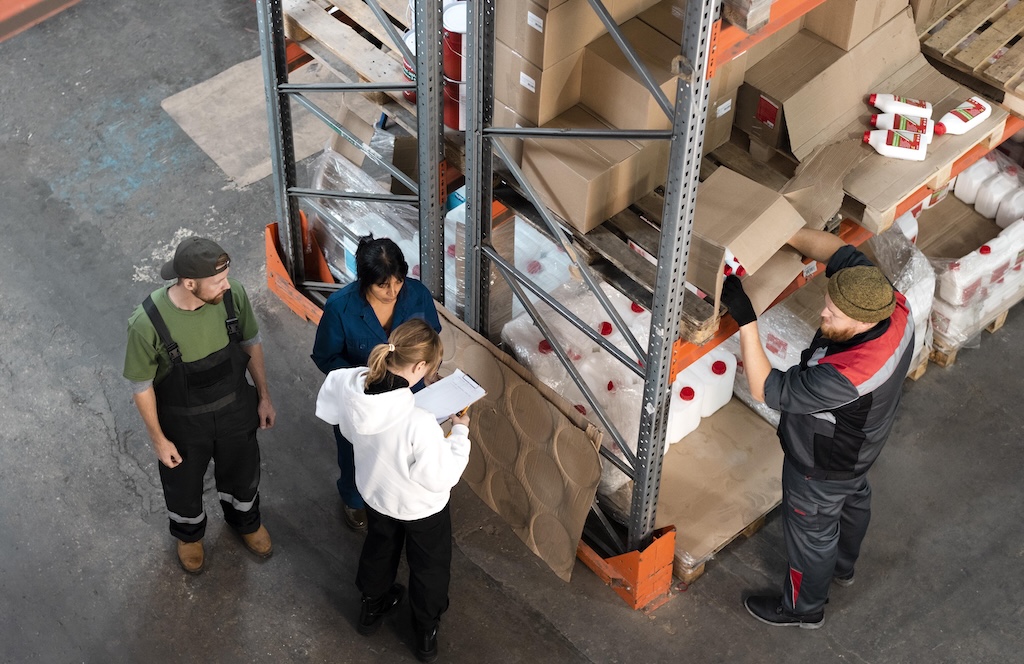
What is a Fulfillment Center vs. Warehouse

Top posts

What is a Fulfillment Center?
A fulfillment center is a warehouse operations facility that owns and operates advanced technologies, detailed workflows, and processes to receive, manage, audit, pick, pack, and ship direct-to-consumer and wholesale orders nationwide.
Fast delivery has become the norm in the last few years, especially after the 2020 shutdowns with mass e-commerce expansion. But many still wonder how the products make it to the doorstep. Some still think it's as simple as placing the item in a box or bag, applying the label, and handing it to the community UPS driver. It's all but that! Behind the magic of one-day or even same-day delivery is a powerful network of fulfillment centers.
If you're a brand owner looking to step into the direct-to-consumer space, understanding the role and advantages of a fulfillment center can be a game-changer for your business.
The Basics: Fulfillment Centers vs. Traditional Warehouses
A fulfillment center is another big building filled with products, much like a traditional warehouse. However, while both house products, their primary functions are different.
A traditional warehouse operation is mainly a storage facility. Items come in, stored for extended periods, and then moved out in bulk, often to retailers. Bulk inventory going into and out of a warehouse to a retailer has terminologies like dock-to-dock, pallet-in-pallet-out, or cross-docking.
A fulfillment center, on the other hand, is all about quick and efficient product distribution across omnichannel fulfillment strategies. It's a hub where your products are stored, packed, and shipped directly to the end consumer. The process is swift to ensure timely deliveries, especially in today's fast-paced e-commerce world and consumer expectations.
The Role of a Fulfillment Center
Imagine you're selling handmade jewelry online. When someone places an order, you'd typically need to find the item, pack it, print a shipping label, and then take it to a postal or courier service. Now, imagine doing that for hundreds or thousands of orders a day!
That's where fulfillment centers come in. They handle the storing, packing, and shipping process for you. Here's a breakdown of the role of a fulfillment center vs. a traditional warehouse:
- Receiving and Storing: When your products are manufactured or ready for sale, they're sent to a fulfillment center. The center's team checks and stores the inventory.
- Picking and Packing: Once a customer places an order, the product is "picked" from the shelves and "packed" for delivery.
- Shipping: After packing, the product is shipped to the customer. Fulfillment centers often work with multiple shipping carriers, ensuring fast and cost-effective delivery.
- Returns: If a customer isn't satisfied and returns a product, the fulfillment center handles that too.
The role of a fulfillment center goes beyond these four bullet points. The level of expertise around inventory managing and workflow is extensive. Here are a few details that an experienced fulfillment center will do that a traditional warehouse storage does not typically do:
- Small parcel movement through conveyance, scanning automation, checks and balances, and error-proofing for accuracy
- ABC inventory management methodology to place fastest moving items within reach, followed by occasionally moving items, then backstock
- Structured inventory counts for annual audits, financial reporting, and performance accuracy purposes
- Cycle counts and bin stock replenishments to never oversell or undersell
- Damage control through robust standard operating to minimize damages and salvage as many returns as possible
- Create a safety culture to prevent injuries to staff and damaged products
- Invest in hardware and software to lean out processes as much as possible to reduce time, increase efficiency, and operational capacity
Benefits of Using a Fulfillment Center
As a brand owner, here's why you might consider using a fulfillment center:
- Scale Operations: With a fulfillment center, you can handle larger orders without the growing pains of manual packing and shipping.
- Quick Deliveries: Since these fulfillment centers vs. traditional warehouses are designed for efficiency, your customers get their products faster. And at scale, your savings are more significant compared to doing it yourself.
- Save Costs: Although there's a cost to using these centers, in the long run, you might save on shipping rates, storage, and even manpower. The cost to run operations at scale is capital-intensive due to the associated technologies, hardware, software, people, and space.
- Focus on Core Business: With logistics off your plate, you can focus on growing your brand, product development, and customer service.
Connecting the Dots: 3PL and WMS
You might hear terms like "3PL" (Third-Party Logistics) and "WMS" (Warehouse Management System) when researching fulfillment centers. In simple terms:
- 3PL: Companies that offer logistics services, like storage and transportation. A fulfillment center is a type of service provided by 3PLs.
- WMS: This is software that helps manage warehouse operations. It tracks products throughout the fulfillment process, ensuring they reach the right customers. It also provides all the intricate warehouse workflows and processes to ensure accuracy, traceability, and accountability of the people, processes, and products.
Stepping into the direct-to-consumer space is exciting but presents operational challenges. A fulfillment center, as part of a broader 3PL strategy, offers a solution to get products into the hands of consumers efficiently. As you grow your brand, understanding and leveraging the power of these centers can provide a strong foundation for success. Utilize an experienced fulfillment center vs. a traditional warehouse to propel your brand's operational needs forward. With solid operations, the customer journey and experience are complete and reflect well on your brand. Check out our 3PL services to learn more about our process and the questions you should ask to ensure you are hiring the right partner.





.png)
